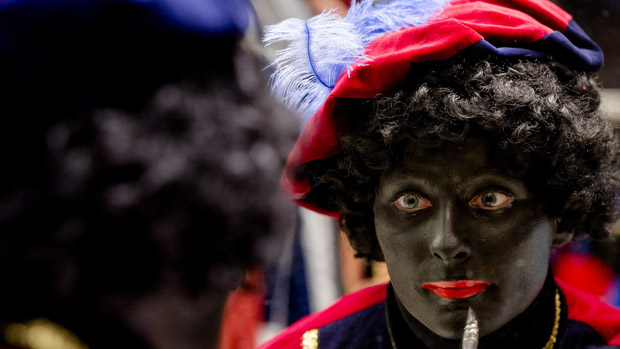Black Pete: harmless tradition or racist throwback?
Protests erupt in the Netherlands as critics say the controversial Christmas character Black Pete should be banned

A free daily email with the biggest news stories of the day – and the best features from TheWeek.com
You are now subscribed
Your newsletter sign-up was successful
Dutch police have arrested 90 people after protesters clashed at a children's festival in the city of Gouda celebrating the controversial Christmas character, 'Black Pete', usually portrayed by a white person with a blacked up face.
"Arrests were made on both sides," according to police spokeswoman Yvette Verboon, as the debate surrounding the Christmas tradition continues to polarise Dutch society, Al Jazeera reports.
According to centuries old folklore, Black Pete is Father Christmas's servant who climbs down chimneys to help him deliver presents to children. But critics say the character, known in Dutch as Zwarte Piet and depicted with a painted black face, large red lips and an afro is a racist caricature that harks back to the country's colonial era.
The Week
Escape your echo chamber. Get the facts behind the news, plus analysis from multiple perspectives.

Sign up for The Week's Free Newsletters
From our morning news briefing to a weekly Good News Newsletter, get the best of The Week delivered directly to your inbox.
From our morning news briefing to a weekly Good News Newsletter, get the best of The Week delivered directly to your inbox.
"The character must speak poor Dutch with a stupid accent, and must act childlike and mischievous when performing," Siji Jabber writes for The Guardian. Songs sung by school children about Black Pete include the lyrics: "Even if I'm black as coal I mean well".
A group called Zwarte Piet is Racism, which opposes the tradition, argues that the image "perpetuates a stereotyped image of African people and people of African descent as second-class citizens, fostering an underlying sense of inferiority within Dutch society and stirring racial differences as well as racism".
"We are supposed to be living in the most tolerant and anti-racist country in the world," Jerry King Luther Afriyie, a Ghanaian-born Dutch citizen who is a member of the group told the BBC. "In the 21st Century there should be no room for racism, especially open racism."
Both the United Nations Human Rights Commission and the Council of Europe's Anti Racism Commission have concluded that the custom is offensive to ethnic minorities.
A free daily email with the biggest news stories of the day – and the best features from TheWeek.com
However, supporters of the tradition argue that it is not a racist depiction, as the colour of Black Pete's skin is a result of him climbing down a dirty chimney. The reason for his large red lips, however, remains unexplained.
There exists overwhelming support for the tradition among the Dutch population, the New York Times reports. According to pollsters in the Netherlands, over 91 per cent of the population rejects the notion that Black Pete is racist.
The Facebook community that celebrates Black Pete has over two million 'likes' and Geert Wilders, the leader of the far-right Dutch Freedom Party is attempting to protect the colour of the character's skin by law.
"In general, attacks on Zwarte Piet are widely interpreted as attacks on (white) Dutchness and threats to (white) children's right to jovially celebrate their 'cultural heritage'", the human rights activist Maria Hengeveld writes for the Africa is a Country website.
She argues that politicians, lawmakers and big businesses "are sensitive to public feeling" on the issue. Albert Heijn, the country's largest supermarket chain, went back on its promise to ban Black Pete from its stores after a huge public outcry.
Last week, the highest administrative court in the Netherlands overturned the ruling of a lower court which had called Black Pete "a negative stereotype" that "infringes on the European treaty of human rights".
"Black Peter is black," the country's Prime Minister Mark Rutte said recently, defending the tradition. "We cannot do much to change that."
-
 Companies are increasingly AI washing
Companies are increasingly AI washingThe explainer Imaginary technology is taking jobs
-
 The 9 best steroid-free players who should be in the Baseball Hall of Fame
The 9 best steroid-free players who should be in the Baseball Hall of Famein depth These athletes’ exploits were both real and spectacular
-
 ‘Bad Bunny’s music feels inclusive and exclusive at the same time’
‘Bad Bunny’s music feels inclusive and exclusive at the same time’Instant Opinion Opinion, comment and editorials of the day
-
 Epstein files topple law CEO, roil UK government
Epstein files topple law CEO, roil UK governmentSpeed Read Peter Mandelson, Britain’s former ambassador to the US, is caught up in the scandal
-
 Iran and US prepare to meet after skirmishes
Iran and US prepare to meet after skirmishesSpeed Read The incident comes amid heightened tensions in the Middle East
-
 Israel retrieves final hostage’s body from Gaza
Israel retrieves final hostage’s body from GazaSpeed Read The 24-year-old police officer was killed during the initial Hamas attack
-
 China’s Xi targets top general in growing purge
China’s Xi targets top general in growing purgeSpeed Read Zhang Youxia is being investigated over ‘grave violations’ of the law
-
 Panama and Canada are negotiating over a crucial copper mine
Panama and Canada are negotiating over a crucial copper mineIn the Spotlight Panama is set to make a final decision on the mine this summer
-
 Why Greenland’s natural resources are nearly impossible to mine
Why Greenland’s natural resources are nearly impossible to mineThe Explainer The country’s natural landscape makes the task extremely difficult
-
 Iran cuts internet as protests escalate
Iran cuts internet as protests escalateSpeed Reada Government buildings across the country have been set on fire
-
 US nabs ‘shadow’ tanker claimed by Russia
US nabs ‘shadow’ tanker claimed by RussiaSpeed Read The ship was one of two vessels seized by the US military